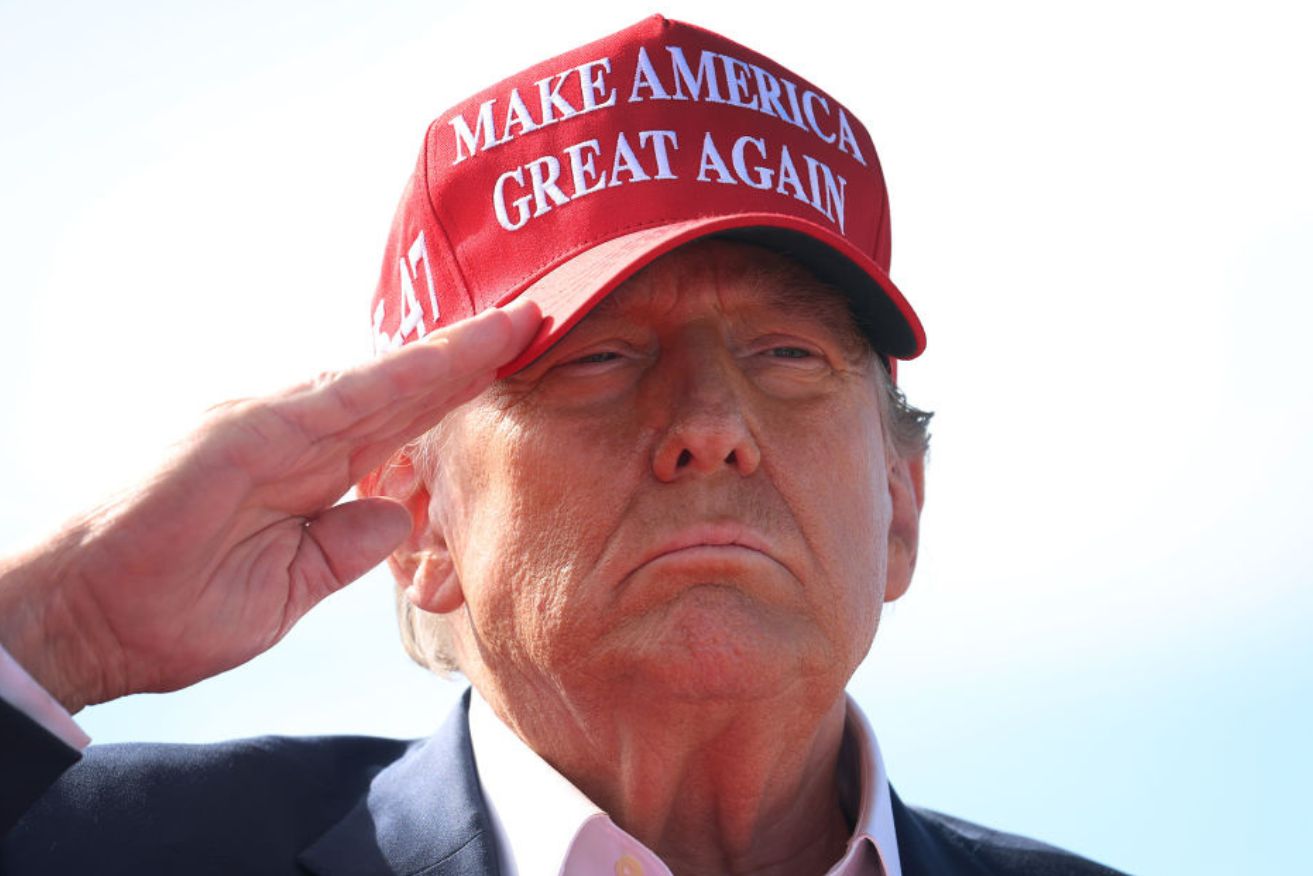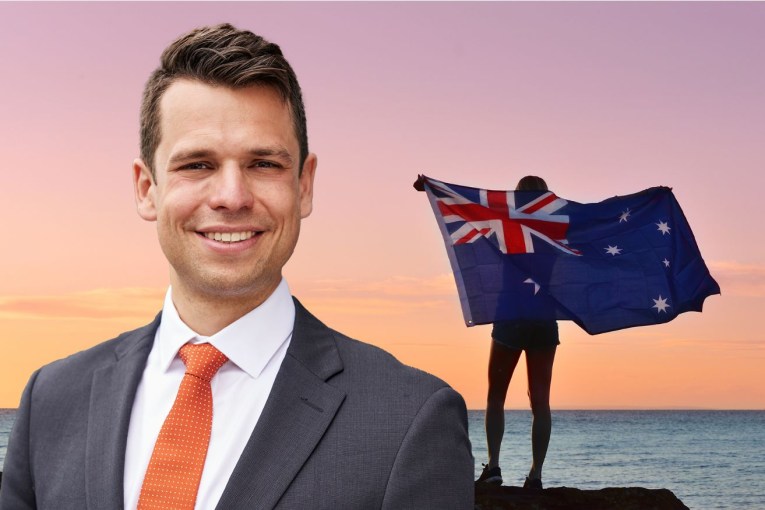USA increasingly protectionist, no matter who wins


Donald Trump arrives for a rally at the Dayton International Airport last week. Photo: Getty
You know the Coalition’s “Labor will kill the weekend” scare campaign about utes and electric vehicles? Donald Trump is up to something similar – unsurprisingly – as Joe Biden proposes tougher emissions standards.
While Australia is belatedly proposing to catch up with the old American emissions standards, the Biden administration is ruling to go further, aiming for the majority of new vehicle sales to be EVs or hybrids by 2032.
It was in the context of whipping up EVs fear that Trump made his now-infamous “bloodbath” threat if he loses the election.
The bad news for us about this facet of the election fight is threefold:
Firstly, it’s another example of the populist misinformation and lies that increasingly look like putting Trump back in the White House. A febrile toddler President heading a radically reactionary administration means a flakey Club Trump USA – a nation nobody can rely on.
(The conservative pearl-clutchers ranting over the stunt Sky News pulled on Kevin Rudd were ironically making a strong case if Trump is elected for Australia reclaiming the sovereignty it’s been steadily ceding to the US.)
Secondly, given the LNP’s ritualistic apeing of Republican political tactics, standby for scaremongering over China to be added to the anti-EV campaign.
Thirdly, it’s another indication of the US turning increasingly protectionist whoever wins in November. Partly that’s old-fashioned domestic politics, partly it’s the US seeking to contain China, dividing the world into “us” and “them”.
Not good news
As an outward focused trading nation, especially one with a large trade surplus with China, that’s not healthy for Australia.
Australia has been keen to get inside Biden’s protectionist tent on the defence industry and strategic metals fronts, but it can be a dangerous place in which to bed down whether Biden or Trump is hosting.
Example: Biden suddenly wants to block the agreed takeover of US Steel by Nippon Steel. “Old bond dog” and veteran economic commentator Anthony Peters provided a quick context:
“President Biden is already looking to steal Donald Trump’s isolationist clothing by blocking the acquisition of US Steel by Nippon Steel. Take an ailing business suffering from underinvestment and outdated technology, take an advanced competitor from one of your staunchest allies and most important partners close to your greatest geopolitical rival which has the wherewithal to bring your guys up to speed and put them back on the map, then declare the company to be of strategic importance and block the trade. If Biden wants to accuse Trump of being an isolationist, what the hell is he playing at?”
The US still has a car industry to protect. Both Biden and Trump are keen to do so. That will mean excluding the world’s leading manufacturer of EVs – China – from the domestic market by one means or another.
One of those means already trialled is alleging security concerns about Chinese vehicles. You just can’t trust your BYD electric not to steal state secrets.
The funny thing about that is the amount of information on drivers that non-Chinese cars are already hoovering up and selling. As the New York Times detailed last week, internet-connected cars are feeding details of individuals’ “hard” acceleration, braking and speeding to data brokers who sell that to insurance companies who then spike premiums for the driver.
There’s a Jacobin summary here that goes further, including a reference to an article by University of NSW associate professor Katharine Kemp last year highlighting that Australia’s privacy laws mean we have even less information about what car companies are doing with our data.
Ways your car spies on you
As Jacobin reported, Kemp offered a laundry list of just how your car spies on you and what it collects. It includes “speed, steering, brake and accelerator pedal use, seat belt use, infotainment settings, phone contacts, navigation destinations, voice data, your location and surroundings, and even footage of you and your family outside your car”.
She also pointed out that: “Between 2019 and 2022, Tesla employees internally circulated intimate footage collected from people’s private cars for their own amusement.”
As so often is the case, whatever the US accuses China of, the US is already doing.
Australia no longer has a car industry – take a bow, the Coalition, which, like Labor, prefers massive protectionism for inflated defence projects in key electorates, a policy that now extends to direct donations for jobs in the US and UK defence industries – $9 billion worth to keep our place in the queue for nuclear-powered submarines.
Without the domestic political pressure of protecting car manufacturing jobs, we should be able to fully exploit China’s EV revolution, bringing down the cost of EVs and allowing “the market” to work.
One of the sites I visited as part of the Asia Pacific Journalism Centre/All-China Journalists Association exchange in October was the Changan Automobile headquarters in Chongqing. Changan manufactures ICE and EVs under multiple brands in China, including Ford and Mazda.
The company boasts an international R&D workforce of some 17,000 people operating 24 hours a day around the globe, engineers and designers of multiple nationalities working in their own time zones but predominantly in China. (Of course it takes an Italian designer to pen the better-looking vehicles.)
While it is the smallest of the “Big Four” Chinese car companies, it is rated highest for R&D.
Unfortunately, there was no opportunity to test drive the cars in Chongqing. Changan’s vehicles are not available in Australia – yet.
“Australia is the next target,” one of our guides said.
Changan reported sales of more than 2.55 million vehicles last year – mostly with internal combustion engines, but the future is increasingly electric.
By comparison, China’s Warren Buffet-backed BYD produced more than 3 million EVs and hybrids last year, compared with Tesla’s 1.84 million. In the December quarter, BYD outsold Tesla in pure EVs.
BYD undercuts the comparable Tesla model in Australia – but both are made in China.
Australian car retailers remain ICE-dominated, hence the local industry’s attempt to drag the chain on improving our lax emissions standards. Those retailers – all the dealerships and service centres – can also be expected to seek whatever protection they can get from new entrants.
Peter Dutton has signalled he is open to any scare campaign going. If defending the ICE ute image can include some China bashing, it will happen.
Ammo for the culture wars
As Lech Blaine summarised in one sentence of his Quarterly Essay, Bad Cop: Peter Dutton’s Strongman Politics:
“Presented with a platform for a serious debate about tax reform, Dutton ricochets like a pinball into culture wars.”
I’ve spent the past couple of weeks in the US. (Balance – China in October, US in March.)
The casual observation here is that the culture wars work for a disturbingly large proportion of the American population.
Despite everything, absolutely everything, Trump is increasingly seen as the likely winner in November.
It would be unfortunate for Australia if that further encouraged the LNP to push culture wars and fantasies rather than actual policy – a problem much bigger than the odd Hilux.








